Will Bloomington burn big bucks in payouts, if billboard ban is OK’d? Plan commission punts vote
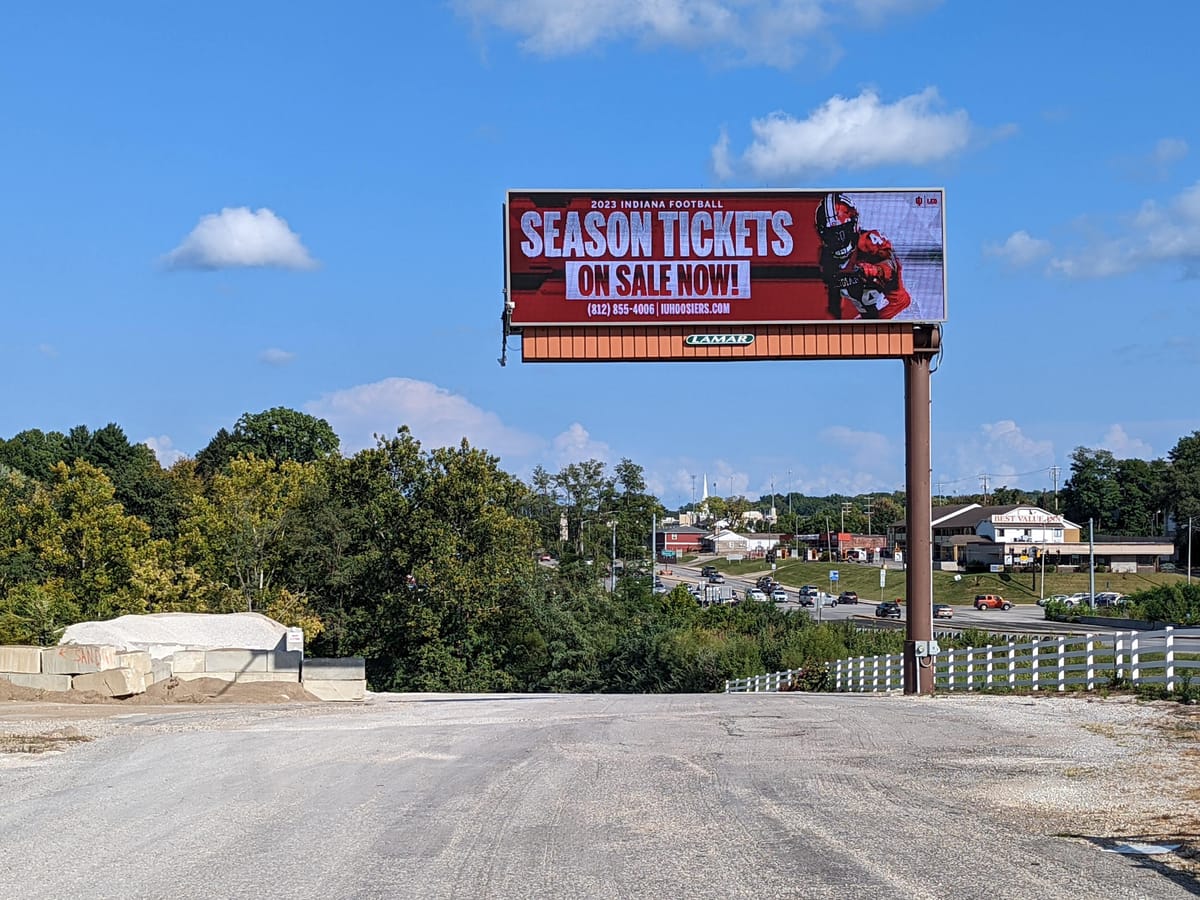
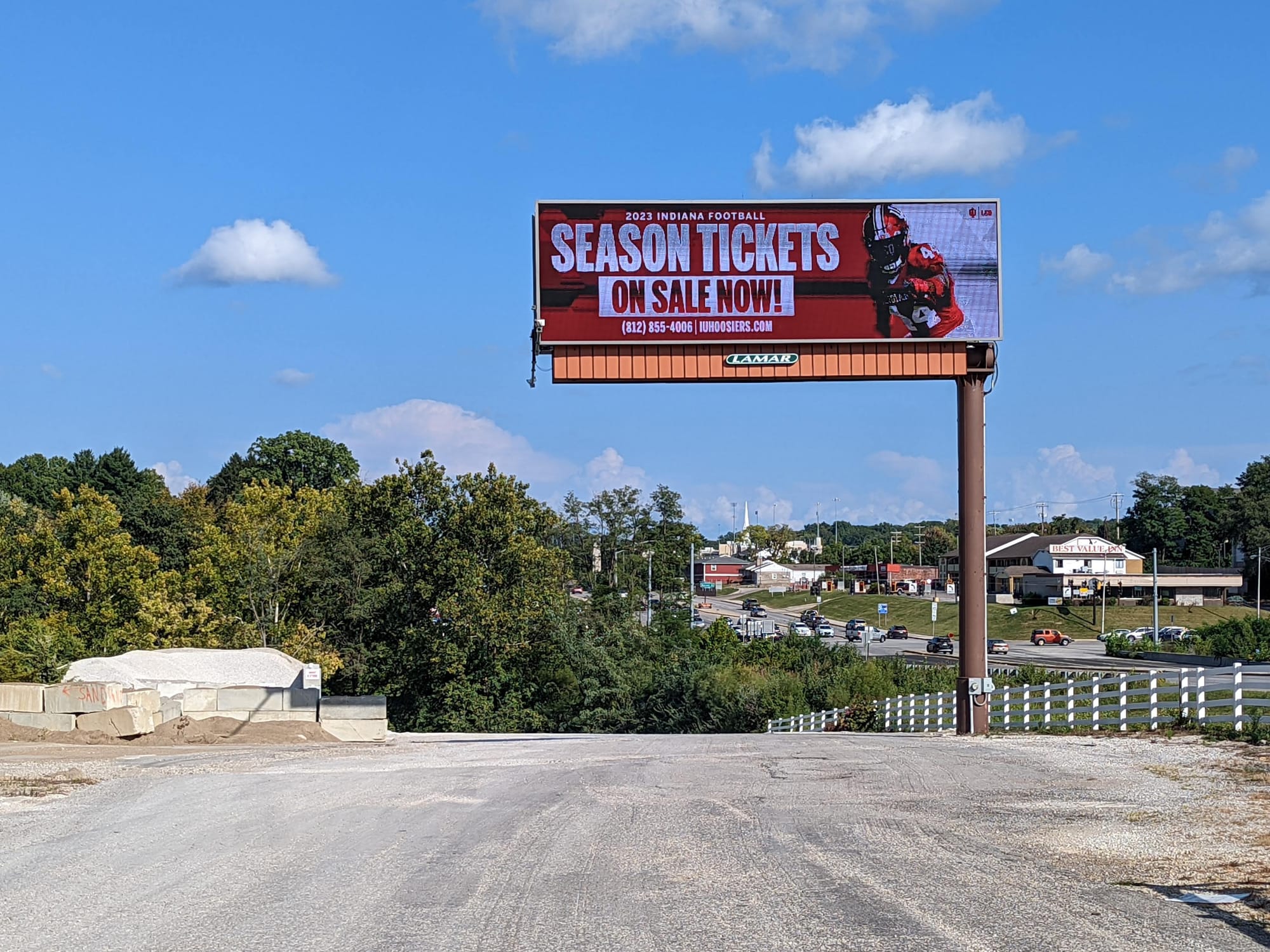
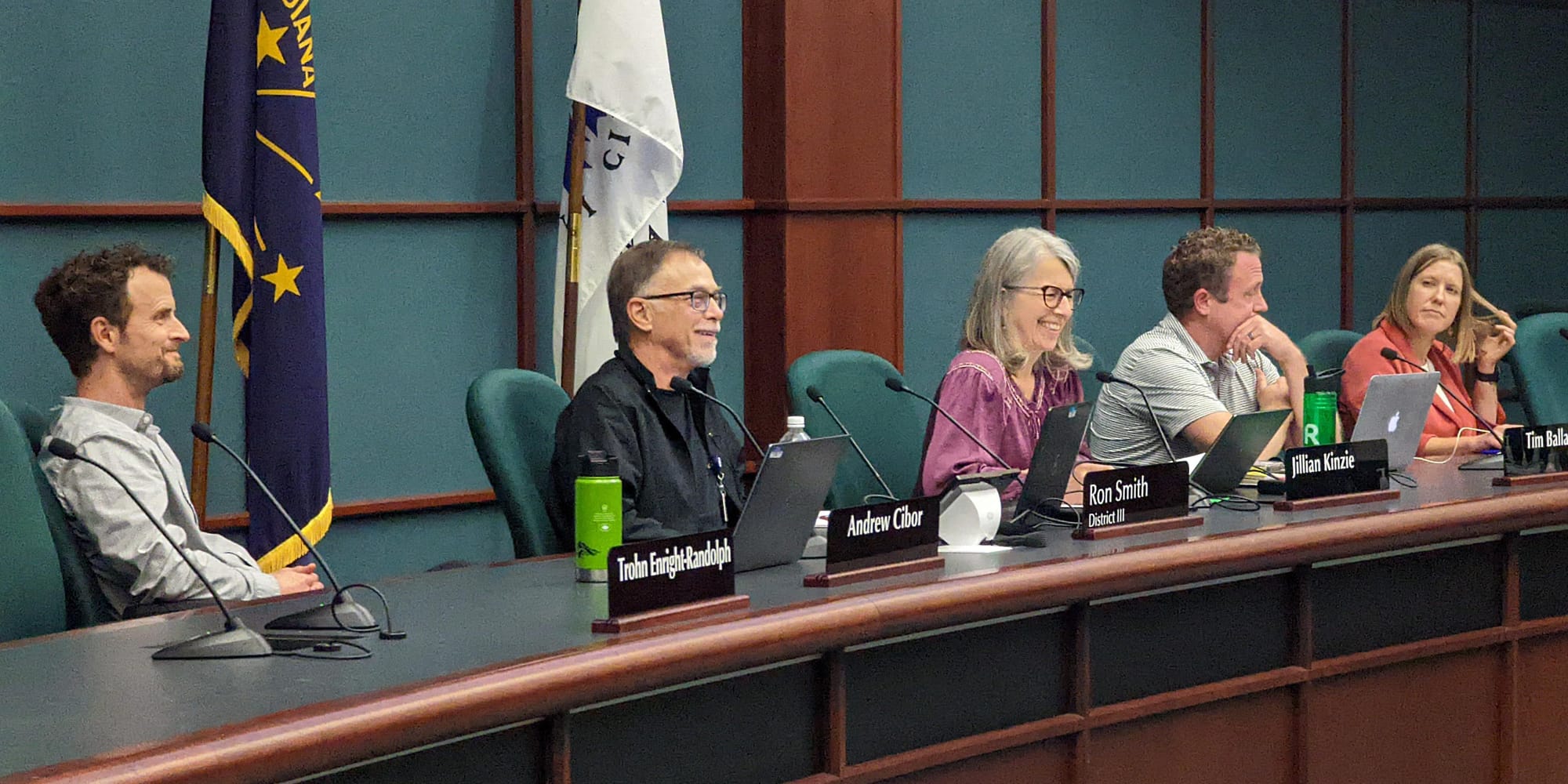
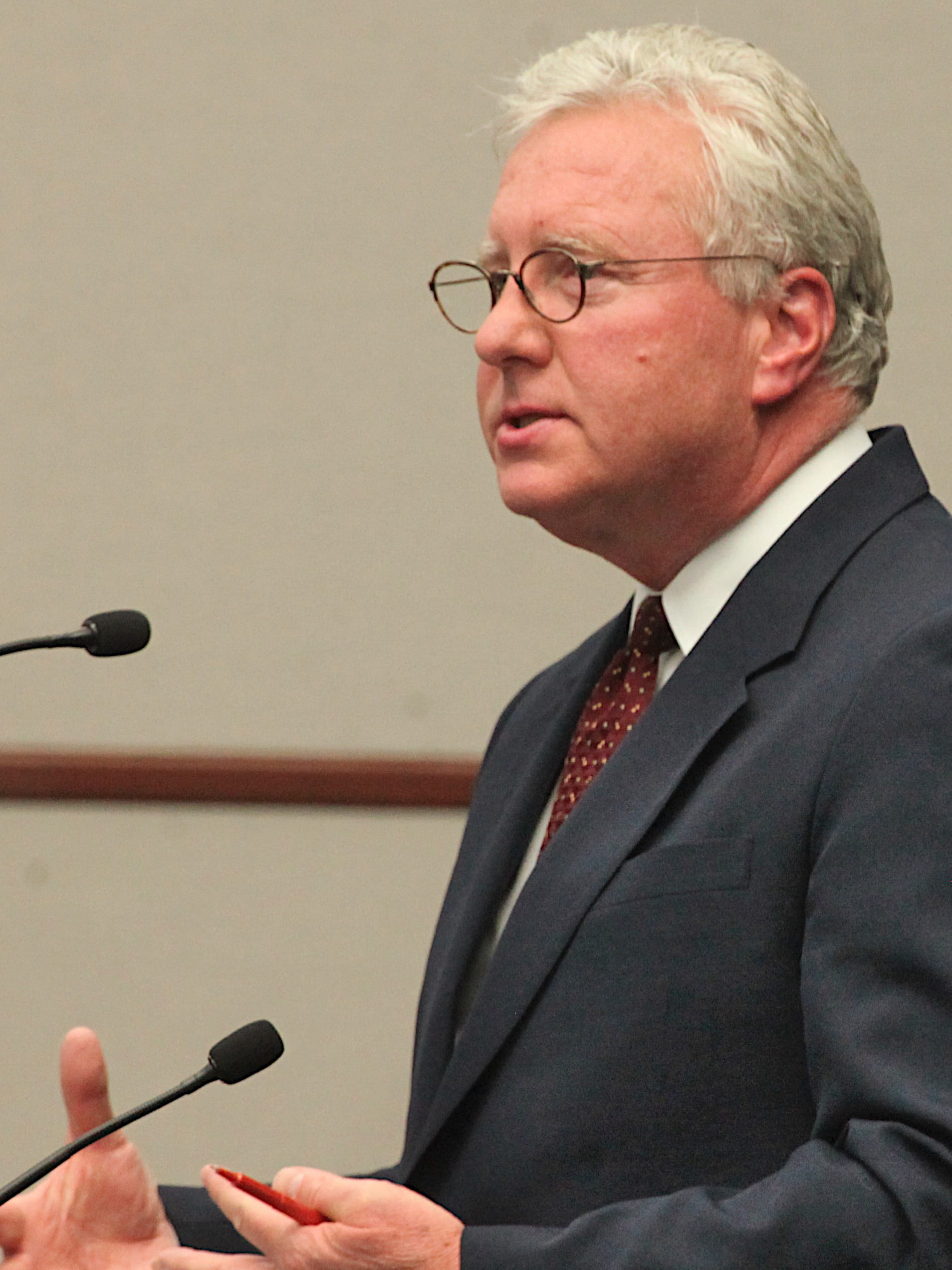
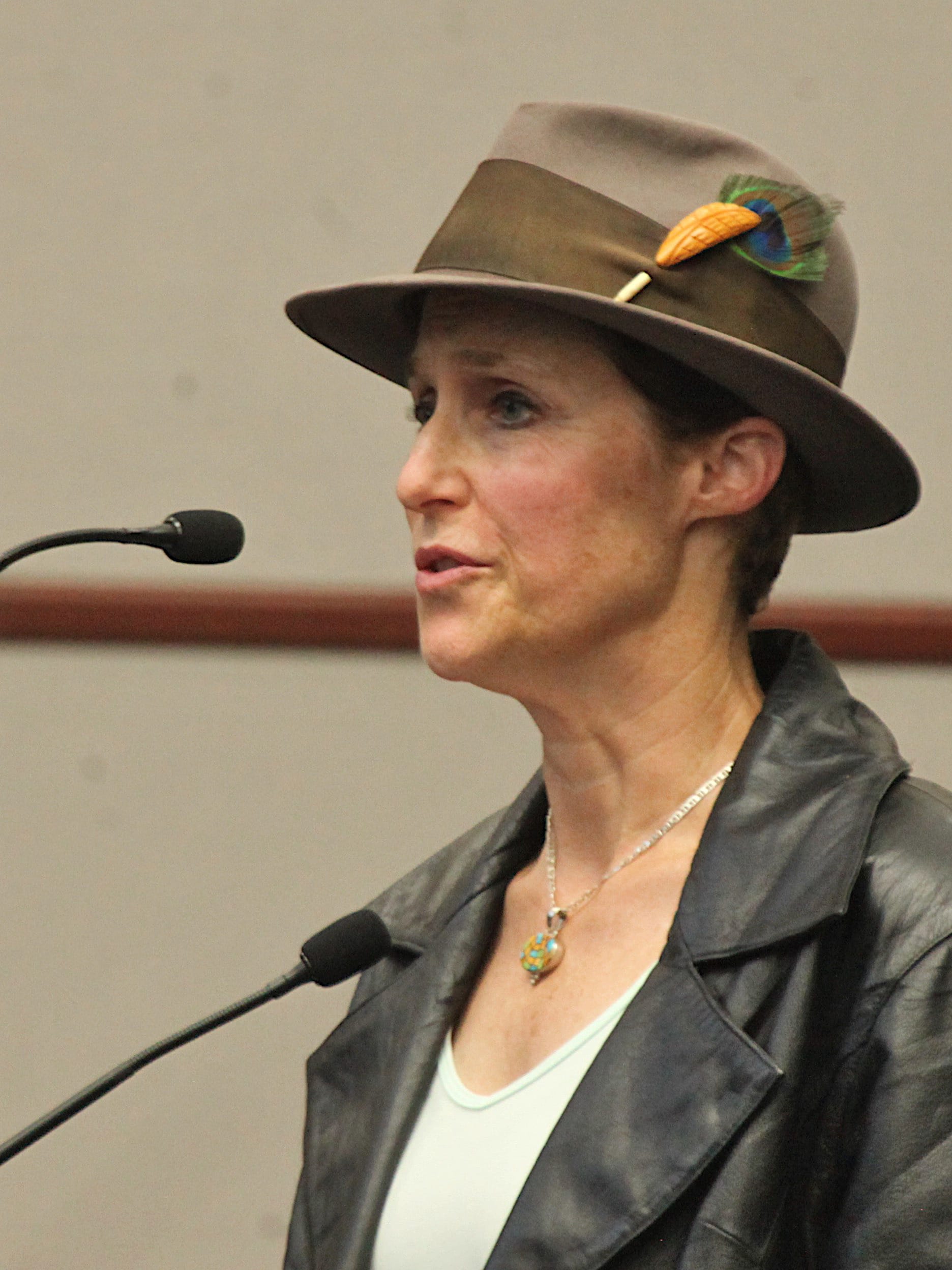
On Monday night, a short-handed Bloomington plan commission put off a vote on a proposed phasing out of billboards in the city by 2031.
One big question that emerged during Monday’s meeting: How much compensation will Bloomington have to pay billboard owners, if the city causes them to remove their billboards by using zoning laws?
Based on Monday’s meeting deliberations, the question of compensation for billboard owners is one that the city’s legal department had apparently not contemplated up to now. Monday’s meeting marked the second required hearing in front of the plan commission, after a first hearing in September.
The commission will likely take up the question again at its Nov. 6 meeting. It’s the Bloomington city council that will have the final say on the question.
The public commentary, from at least nine speakers, was uniformly against the billboard ban, for several reasons. Among the arguments was the idea that there’s a benefit to local businesses and nonprofits from an effective and economical form of advertising.
Bose McKinney attorney Alan Townsend, who represents billboard owner Lamar Outdoor Advertising, delivered a presentation from a bound booklet that he distributed to commissioners.
A highlight of Townsend’s presentation was a citation from Indiana Code [IC 8-23-20-16] which reads in part (emphasis added):
Before an outdoor advertising sign, display, or device is removed, taken, or appropriated through the use of zoning or another power or authority of the state, a state agency, or political subdivision:
(1) the value of the sign, display, or device shall be determined by the taking authority without the use of an amortization schedule; and
(2) the owners of the sign, display, or device and of the real property upon which the sign, display, or device is situated must be paid full and just compensation for the taking.
Ron Smith, who serves as the city council’s representative to the plan commission, questioned Bloomington’s corporation counsel Beth Cate about the issue of compensation. Cate was keen to stress that she does not believe that the city would be embarking on an unconstitutional taking of property, if the billboard ban were enacted.
But Cate did seem to indicate that the city had not yet considered the impact of IC 8-23-20-16 in the analysis of its proposal to amend the text of the city’s unified development ordinance (UDO). The amendment would phase out most billboards in the city by 2031, with the phases defined by zoning district.
Cate said, “The question surrounding the statutory protection for compensation is separate from the constitutional protection. And I think that the potential cost—this is something that we will obviously be talking about exploring.”
Cate followed up to clarify: “The statute that Mr. Townshend referred to is Indiana code, so not the Constitution.” She continued, “it is a statutory protection, which we will look into further and examine what the potential costs would be.”
Cate added, “And I think that that’s obviously a factor that would bear on whether or not this body considers it appropriate to forward [to the city council], and whether we consider it appropriate, obviously, as well.”
There are four options for plan commissioners. They can forward the proposal to the city council with: a positive recommendation; a positive recommendation with attached conditions; a negative recommendation; or no recommendation.
The certification of the plan commission’s action to the city council has to be completed within 10 days of the action. After that, the plan commission’s action becomes final, if the city council does not otherwise act within 90 days.
That means if the plan commission votes one way or another on the billboard ban in early November, the current edition of the city council could choose to take it up before the end of the year. Or the current council could decline to act on it. The new edition of the council, which gets sworn in on Jan. 1, 2024, would still have about 45 days to vote on the billboard question.
Plan commissioners were not eager to put the question to a vote on Monday night, in part because they were short three members: Chris Cockerham, Karin St. John, and Brad Wisler. It would have likely been a challenge to achieve the required five-vote majority to pass any motion. So they voted to continue the city’s petition until their Nov. 6 meeting.
But on Monday, two plan commissioners indicated at least an inclination to forward the ordinance to the city council with a negative recommendation.
Plan commissioner Flavia Burrell, who was participating using the Zoom video conferencing interface, said, “I don’t think it’s just so clear cut, that we just want to eliminate something that has been legally installed. I don’t see a rush into this.” Burrell added, “I think this is something that needs to be discussed thoroughly. As it stands right now. I don’t I don’t see myself voting for this in a positive way.”
Plan commissioner Tim Ballard indicated his support for Burrell’s remarks. Ballard wanted the financial impact to be spelled out before the commission takes up the matter again. “I think any any kind of recommendation from this board, without compensation discussions, is a nonstarter for me.”
Ballard continued, “I think this is a very slippery slope between government’s role and private business.” He added, “I feel like the legalities have to be sorted out much better on the city’s end, to be able to continue that conversation.”
Under Bloomington’s city code, any ordinance is supposed to be accompanied by a fiscal impact statement.
It’s not clear if the administration will be prepared to provide an analysis of the financial impacts of the billboard ban in time for the Nov. 6 meeting. Development services manager Jackie Scanlan indicated there was a possibility of the question being continued administratively to the December plan commission meeting, without it coming in front of the plan commission in November.
The city’s effort to get a billboard ban enacted comes in the context of pending litigation over the billboard owned by Lamar Outdoor Advertising at Kinser Pike and the SR 45/46 bypass.
The court case arose in 2022 after Lamar converted the static sign to a digital display. Glossing over details, Bloomington cited Lamar for a violation of the UDO, and Lamar appealed the notice of violation to Bloomington’s board of zoning appeals, but lost the appeal on a 3–2 vote. Lamar’s next step was to file a legal action in the Monroe County circuit court.
The case is set for oral arguments on Dec. 14 in front of Monroe County circuit court judge Kara Krothe.
The history of the Kinser Pike billboard, which is recited in Lamar’s legal complaint, dates back to 2007, when then-owner Hoosier Outdoor Advertising Corporation struck a bargain with the city of Bloomington.
A four-panel outdoor advertising sign would be removed from South College Avenue, but in exchange, the city of Bloomington agreed to support Hoosier Outdoor’s variance for building a two-panel sign at some location acceptable to both Hoosier Outdoor and the city. That location turned out to be Kinser Pike at the SR 45/46 bypass.
After acquiring Hoosier Outdoor’s assets, Lamar asked Bloomington’s board of zoning appeals (BZA) for a variance from the UDO, to build the sign at that location. That variance was granted in 2010.
At the Dec. 16, 2010 hearing in front of the BZA on the variance to erect a billboard at the location, then city attorney Patricia Mulvihill responded to a board question by saying, “Yeah, it’s gonna be there forever.”
Here’s the video from the 2010 BZA hearing, excerpted from the recording that was provided by Community Access Television Services (CATS) at The B Square’s request:




Comments ()